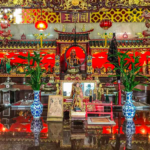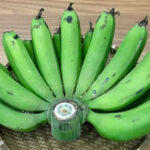Why You Should Place Vases on Your Ancestral Altar
Vases, also known as lộc bình in Vietnamese, bring a sense of solemnity and tranquility to your ancestral altar. These vases are smaller than traditional lộc bình, making them a perfect fit for your altar, adding to its dignity and reverence.
Placing ceramic vases on your ancestral altar holds feng shui significance, helping to gather and retain positive energy from the heavens and the earth. This practice also contributes to maintaining a clean and dignified space for worship.
It is believed that placing vases on the ancestral altar brings good fortune, prosperity, and success to the family. During special occasions and full moon days, the gentle fragrance of flowers in the vases adds to the sacredness and serenity of the worship space.
Arranging Your Ancestral Altar with Two Vases
When placing two vases on your ancestral altar, arrange them symmetrically on both sides, with the fruit tray placed in the center, in front of the incense burner. This arrangement not only creates a balanced and cozy atmosphere but also preserves the spiritual significance of the vases on the altar.
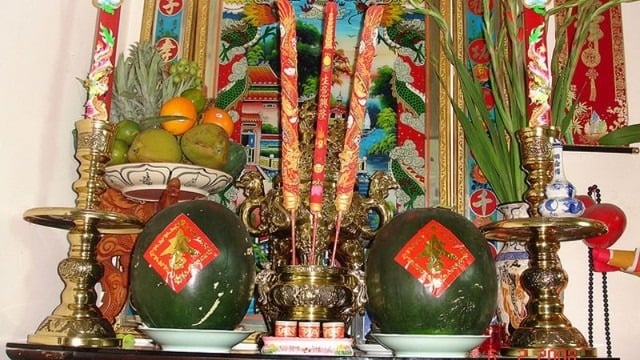
Arranging two vases symmetrically on the altar with the fruit tray in the center.
In addition to the vases, pay attention to other worship items such as the three-piece or five-piece sets, ceremonial trays, and incense holders to enhance the solemnity and completeness of the worship space. For smaller altars, like wall-mounted ones, you may opt to place just one vase and an incense holder symmetrically.
Avoid overcrowding the altar with too many vases, as it may make the space look cluttered and imbalanced. Choose vases made of ceramic, porcelain, or glass to create a light and elegant feel, steering clear of those made of copper or iron.
The type of flowers displayed on the altar should have a gentle fragrance, be free of thorns, and be neatly trimmed to ensure a safe, clean, and spiritually intact worship space.
Placing a Single Vase
Following the principle of “Đông bình tây quả” passed down from our ancestors, the vase should be placed on the east side, and the tray of five types of fruits on the west. The ancestral altar is usually positioned in the center of the house, facing south. The vase is placed on the left side of the altar (east) so that when the east or southeast wind blows, the fragrance of the flowers permeates the entire space.
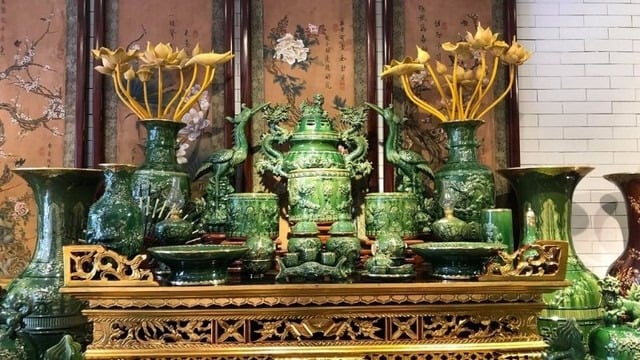
Following the “Đông bình tây quả” principle: vase on the east, fruit tray on the west.
This arrangement symbolizes the sprouting and blooming of spring in the east and the harvest and abundance of autumn in the west, wishing for good fortune, successful descendants, and abundant wealth for the family.
The Significance of Placing the Vase on the Left Side of the Ancestral Altar
Families who value worship rituals often pay special attention to arranging their altars according to feng shui principles. They believe that this shows respect to their ancestors and brings good fortune to the family.
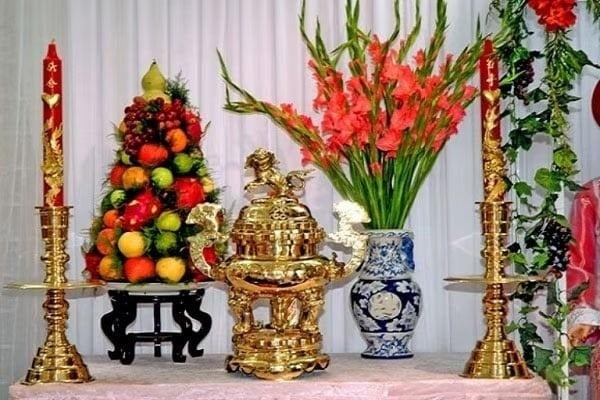
Following the “Đông bình tây quả” rule, the vase is placed on the left (east) side of the altar.
When using a single vase, it is typically placed on the left side of the altar, adhering to the “Đông bình tây quả” principle. This arrangement mirrors the natural order of the sun rising in the east and setting in the west, as well as the blooming of flowers before the fruit-bearing stage. By aligning with nature, this setup is believed to bring harmony and good fortune to the family.
Additionally, if your ancestral altar faces the main entrance to the south, placing the vase on the left side (east) will allow the floral fragrance to permeate the space when the east and southeast winds blow, infusing the worship area with tranquility and solemnity.
Why You Should Avoid Those With Sunken Cheeks, According to the Elders
“A wise old adage warns against associating with those devoid of flesh on their cheeks, for these individuals may embody a life of hardship, reflected in their austere countenances. Such austerity, according to the ancient art of physiognomy, can indicate a person’s potential for trouble in relationships, marked by a lack of sincerity and an inclination to prioritize self-interest above all else.”
The Altar’s Fruitful Warning: A Single Banana Bunch is Prosperity, a Pair Brings Calamity.
The practice of combining two banana stalks to create a larger offering is a common but ill-advised shortcut. According to Feng Shui principles, this makeshift arrangement can lead to financial setbacks and misfortune. It is believed that the imbalance created by the combined stalks disrupts the harmonious energy flow, resulting in negative consequences. A single, ample banana stalk is always the preferred choice for a prosperous and auspicious offering.



























